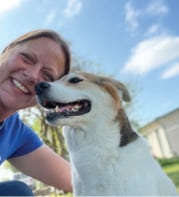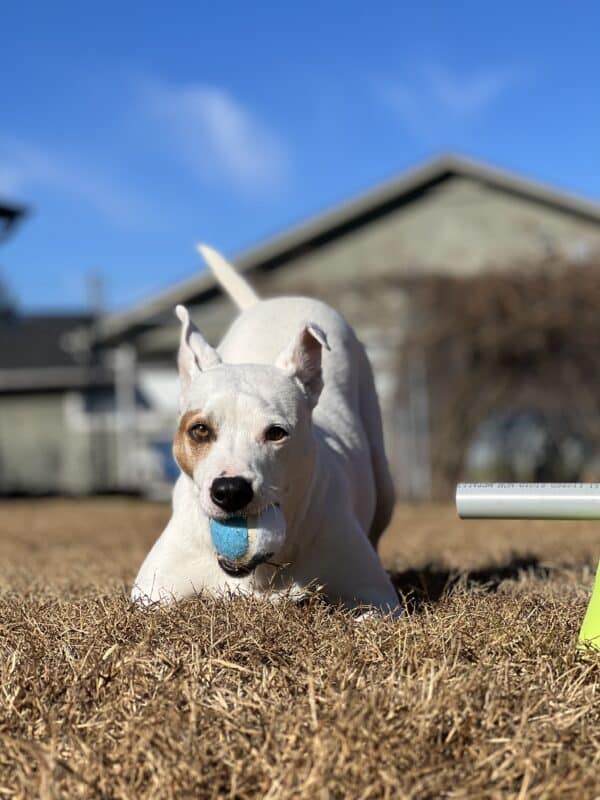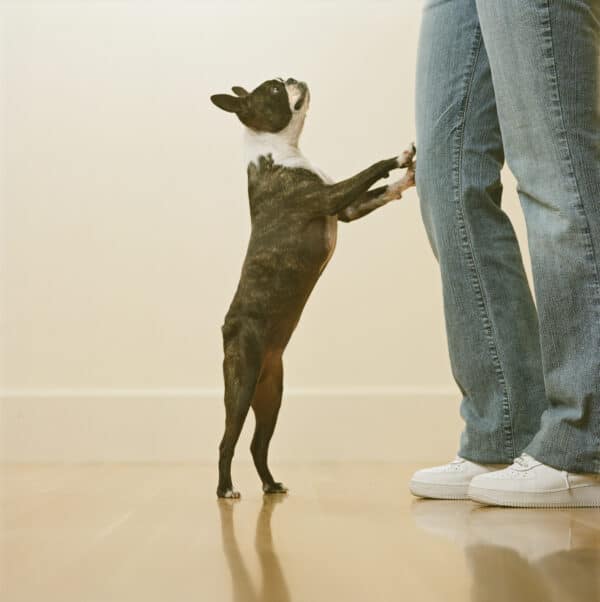Frolicking freely through the open wilderness is every dog’s dream. But it can quickly turn into a nightmare, so safety is top priority. Start off-leash training early, and make sure you know how to teach a dog recall.
Since most public spaces have leash requirements, check for safe spaces for your dog to run free. Vigilant monitoring is also key: Know where he is and what he’s up to, so you avoid mishaps, confrontations and injury. And, definitely train a solid check in and recall to make off leash experiences safe and fun.
When to start off-leash training
Since being off leash is largely about teaching your dog “Recall,” you can start off-leash training at any age. However, first consider whether your dog should be off leash and can safely handle the freedom. Here is what you should look for:
- If your dog is overreactive or aggressive to either humans or other animals, it’s too risky — keep the leash on. Unsure? Err on the side of caution and get your dog rewards-based behavioral help first.
- Dogs with strong prey or scent drive (such as Terriers and Hounds) are not good candidates for off -leash time, since their instincts could likely surpass even the most solid training under truly tempting circumstances.
- Does he know basic cues or is he a wild child oblivious to you and your pleas for better behavior? Get a good grip on basic manners, especially a solid Sit and Down for when, not if, things come up off leash.
- Off-leash dogs should be spayed/neutered, up-to-date on vaccinations and flea and tick treatment and easily identified (microchip or ID tags with current info).
Teach a check-in cue first
Once you’ve decided your dog’s a good candidate for being off leash, teach a solid check in; which is invaluable for off-leash training since it encourages your dog to keep tabs on you.
Teach it:
- Start inside the house first and wait for your dog to look/glance at you (yes, it’s that simple).
- When he does, mark (verbally or with a clicker) and reward generously.
- Repeat several times.
- Once your dog’s rocking that, try other rooms in the house.
- Once he gets the hang of it inside, leash him up and take him outside.
- Work check ins into daily activities, walks etc.; make it a part of your routine.
Check-in cue tips:
- Be patient! DON’T say his name or try to get his attention.
- DON’T reward for every check in after the first few — vary the rewards and give out randomly to keep your dog interested, not expectant.
- There’s no cue for this: it’s voluntary, so reward well and often to make it a habit.
How to teach a dog the recall cue
If you want to train your dog to be off leash, he must have a rock-solid recall. Not mediocre or “he comes most of the time” or “when he wants to.” Commit to teaching your dog to respond consistently and reliably. Lightning-fast recall doesn’t happen lightning fast: it takes work and time.
If the learning history with the word Come is ho-hum or even poisoned (to the dog it predicts something uncool), use a different word such as Here! or Front! or something more fun like Banzai! or Jackpot! or any other word you like. You could even try using a dog whistle in place of a word to teach recall.
Teach it:
- Break out the million-dollar treats; experiment to see what your dog really loves (like cut-up turkey franks or freeze-dried meat treats for dogs).
- Start inside a large room or garage with little-to-no distractions with your dog on leash.
- Stand only a few feet from your dog, say your cue (Here, Front, Jackpot or use a whistle) and immediately sprint a short distance away from your dog.
- Mark as soon as he starts following toward you; treat once he gets to you.
- Immediately pay well with treats. No skimping! Slowly dole out several snacks in 3 to 5 second intervals.
- Slowly increase distance and distractions inside but not both simultaneously!
- Once reliable, venture outdoors with your dog on a long line/leash. Repeat the game (short distance, low distractions first).
- Practice in a variety of environments with various levels of distractions.
- Once he’s consistent and reliable, practice in safe (contained) environments off leash.
- Periodically (10% of the time) clip the leash on your dog when he arrives to you, so he gets used to coming and not bolting as soon as you reward. After a second or two release him to resume his previous activity. Increase the duration of the on-leash time slowly up to 10 seconds or so.
- Work into your daily routine/walks/play time etc. so he becomes consistent and reliable in a variety of situations.
Start small, work tall. If your dog can’t respond to you reliably when distracted by a delivery driver, the neighbor’s dog barking or a squirrel on leash walk, he’s not ready for off-leash time!
Tips:
- DON’T take shortcuts. Practice, practice, practice!
- DON’T increase distances and distractions simultaneously.
- DON’T try to do too much too soon.
- If you lose your dog’s attention, go back to where he was last successful and practice more there.
- Are you using those million-dollar treats? He needs to know coming to you is better than anything else on the planet.
- DON’T repeat your dog’s name or the cue. You need your dog’s attention every time. Back up a step (or eliminate a distraction or decrease distance) and practice more. Use clapping, whistling, clucking your tongue, whatever to get your dog’s attention instead.
- DON’T call your dog for anything he might not like in the beginnings of your training and ruin the rockstar reaction. Cuing your dog needs to predict awesomeness so your dog automatically gets the good feels when he hears it.
- DO practice daily, especially with high level distractions specific to your dog.
A word on e-collars: Don’t use them. Despite the wealth of information regarding the detrimental effects of using them, some trainers and training franchises market a “guaranteed off-leash dog” and a “guaranteed recall” with e-collars. Don’t fall for it. Behavior cannot be guaranteed! Besides, no sense crushing your dog’s trust or spirit.
To leash or not to leash
So where can your dog be legally, and appropriately, off leash? Dog parks and dog beaches are two top choices, or you might try looing on Sniffspot.
Even if there are no posted signs or rules on the books, keep in mind that even with a rockstar recall you have no control over the environment and who — or what — is in it.
Potential uh-ohs when dogs are off leash:
- Vehicles
- Hunters
- Wildlife
- Environmental hazards
- Property owners
- Other dogs
- Liabilities (knocking over a child, senior citizen, disabled person)
- Anyone who doesn’t want to be approached by a strange dog
Very few dogs are truly dog social, just like very few people are 100% cool with every person they meet. Don’t put your dog — or someone else’s — in that situation.
Beware environmental hazards, especially in unfamiliar areas. Scope out the scene first before letting your dog run.
Even if you’re in a designated off-leash area or area you believe is safe for your dog, check out his body language. Is he stressed and less able to respond to you or potential situations that arise? Or is he calm and good to go? Are there too many distractions around that your dog might not be able to manage? Set him up for success.
Still unsure whether to leash up? Dog trainer Jenny Williams created this super helpful flow chart to make decisions a snap.
Taking off-leash training on the trail
Ok, so you’ve taught your dog a solid check-in, you’ve got a rockstar recall, you’ve nailed down a safe spot and you’ve evaluated your dog’s current mood, so you’re ready to hit the trails.
Use your leash
Walk with your dog to gauge his reactions to the environment and his demeanor. If he’s giving you the green light, unclip and proceed, reward check-ins and use your recall. Clip the leash. Walk for a bit, continue to reward check-ins and if all is well, unclip for a bit longer. You get the idea. Watch for potentially unsafe or uncomfortable situations (for you, your dog or for others) and help your dog navigate the freedom.
Behavior isn’t guaranteed. Dogs aren’t robots and they, like us, don’t always make the best decisions. Even with the best training it’s possible your dog will make a decision you’d have preferred he didn’t and next thing you know you’re going viral for an off-leash mishap. And everyone appreciates a responsible pet guardian who keeps her dog from acting willy-nilly or invading someone else’s space. All system’s go? Be safe and have fun!






